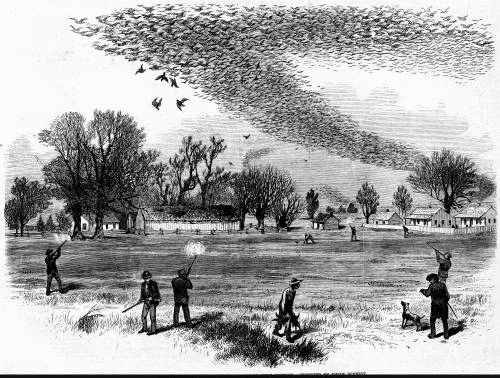September 1, 2014 marks the hundred year anniversary of the extinction of the Passenger Pigeon. Passenger pigeons were once the most abundant bird in North America with a population numbering in the billions.
This species of pigeon, Ectopistes migratorius, lived in large colonies and migrating flocks would turn the sky pitch black as they flew overhead stretching out over a mile wide. The naturalist John Muir once wrote about these pigeons, “I have seen flocks streaming south in the fall so large that they were flowing over from horizon to horizon in an almost continuous stream all day long, at the rate of forty or fifty miles an hour, like a mighty river in the sky, widening, contracting, descending like falls and cataracts, and rising suddenly here and there in huge ragged masses like high-splashing spray.” (The Story of My Boyhood and Youth, Muir, 1913). Many other travelers and explorers wrote about similar experiences during the 1800s and early 1900s.

The last passenger pigeon was a female named Martha after George Washington’s wife. She live out her last days at the Cincinnati Zoological Gardens until her death a hundred years ago on September 1, 2014. Habitat destruction due to mass deforestation and over hunting as cheap food for immigrants and slaves were the two biggest factors in this bird’s demise.

Before its demise, the passenger pigeon’s range was spread out over most of North America east of the Rocky Mountains with its primary habitat being eastern deciduous forests. The large scale conversion of forest to agriculture was the first factor that impacted the passenger pigeon population.

Further Reading:
Ehrlich, Paul R.; Dobkin, David S.; Wheye, Darryl (1988). “The Passenger Pigeon”. Stanford University. Retrieved August 29, 2014.
“Martha,” The Last Passenger Pigeon”. National Museum of Natural History. Smithsonian Institution. Retrieved 29 August 2014.
Yeoman, Barry (May–June 2014). “Why the Passenger Pigeon Went Extinct”. Audubon Magazine. Retrieved 29 August 2014.
